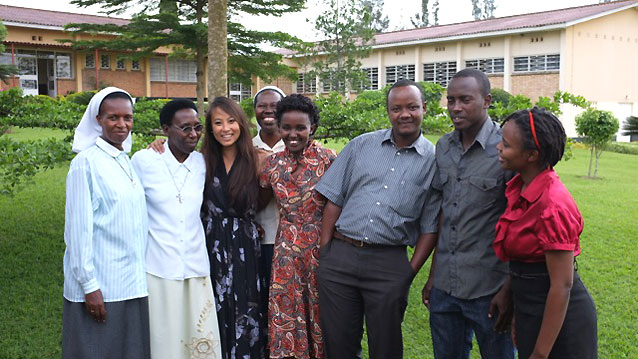EVANSTON, Ill. --- A class on Rwanda history that Lydia Hsu took her junior year at Northwestern University turned out to be the first leg of an incredible African journey that has dramatically transformed the 2011 graduate's life.
The journey continued with a number of trips to Rwanda, where Hsu taught genocide survivors and became deeply involved with the country's people and culture.
“I wanted to know how it was possible that a country that lost 20 percent of its population could recover -- so exceptionally -- from so much trauma,” she said.
Northwestern University’s Office of Undergraduate Research has noticed an emerging trend over the last few years -- increasing numbers of students are seeking opportunities not just to advance their own careers but also to help solve problems in the world.
In between her trips to Rwanda while she was at Northwestern, Hsu also managed to develop an African studies curriculum for Highland Park High School, where she did her student teaching.
And after graduation, she returned to Rwanda once again as one of the first two recipients of a Fulbright English Teaching Assistantship award for work in Rwanda.
Next month Hsu will be heading to Harvard Graduate School of Education to delve deeper into research concerning curriculum development in post-conflict societies -- and after that back to Rwanda.
Following in Hsu's footsteps, this summer 28 undergraduates will travel abroad on undergraduate research grants. Among other topics, they will explore industrial development in Trinidad and Tobago, Saudi religious transnationalism in the United Kingdom, water resources in Tanzania and Uganda and an innovative approach that has effectively eliminated bullying in a school in Norway.
Hsu couldn't possibly have imagined the trajectory of her journey when she first got interested in Rwanda in the history class taught by Jonathon Glassman, a professor of African history at Northwestern.
She was particularly fascinated with Rwanda’s Vision 2020, a 20-year development strategy to transform the country from the humanitarian-assistance phase associated with the 1994 genocide into one of sustainable development.
“I learned not only about Rwanda’s tragic and devastating history but also about what an economic marvel the country is,” Hsu said.
The summer following junior year, Hsu learned firsthand about Rwandans' resiliency during her first trip to Rwanda, where, through a Northwestern engagement grant, she taught and lived with survivors of the 1994 genocide.
The people of Rwanda, she said, offered indelible lessons, on both a personal and an intellectual level, about handling loss and healing. Her students who had lost so much taught her, through their “fables, mantras and stories,” about “seeing life as a gift.”
Hsu became convinced that the best way she could contribute to Rwanda's development was through education.
Her next trip to Rwanda, in December 2010, was funded by a Northwestern undergraduate research grant. This time Hsu interviewed Rwandan directors, actors and authors of genocide literature and film for her senior thesis. The thesis offers an examination of genocide literature and film through the lens of trauma theory.
Back on campus in January 2011, she drew on all those experiences and began to develop curriculum on African studies for high school students, and only a few months later those teaching documents were the focus of a conference she organized.
In her keynote speech at the May 2011 conference, she addressed 60 professors and secondary instructors on teaching about Africa in American secondary schools.
The curriculum used a Kenyan textbook of short stories and relied on African voices to tell Africa’s story.
“I was very focused on not having a single voice of Africa,” Hsu stressed.
A self-described born educator, Hsu graduated with a double major in African studies and English and a secondary English teaching certificate. She carried an average of five to seven courses a quarter during her time at Northwestern.
Hsu returned to Rwanda after graduation through a Wasserman Davis 100 Projects for Peace Fellowship. She designed and launched an educational youth program to engage secondary students in community work at district level hospitals.
In 2012, through her Fulbright, she coordinated and led English workshops at the Rwamagana School of Nursing and Midwifery. She also consulted with the local non-governmental organization Solid’Africa on the construction and sustainability of Rwanda’s first soup kitchen. The kitchen will feed vulnerable patients in Rwanda’s overcrowded public hospitals, where medicine is free but meals are not provided.
At the same time, she was involved in politics, journalism and art in Rwanda. She wrote articles that were published in New Times, a Rwandan daily, and other local publications. Somehow she also found time to play classical piano, her “therapy,” at the Kigali Serena Hotel, where she performed weekly concerts and networked with major artists, business people and politicians instrumental in advancing the country’s development.
Hsu currently is working for Hagerty Consulting, which is facilitating the Hurricane Sandy recovery effort for the city of New York.
“After spending the past two years working on the ground, I wanted to experience what it was like to impact communities from the top down,” she said.
She will be wrapping up her project within the next month and heading to Harvard.
“After that, I will be returning to Rwanda -- hopefully better equipped to make an even greater contribution to the country's Vision 2020 goals,” Hsu said.
It was through the work of leaders like Hsu that the Office of Undergraduate Research began to notice that Northwestern students increasingly are using research experiences to make a difference in the world.
"They’re not just interested in advancing their academic or professional careers -- which are perfectly legitimate goals," said Peter Civetta, director of the Office of Undergraduate Research.
"These students are dedicated to helping make the world a better place. The rest of us are very fortunate to have them out there."


